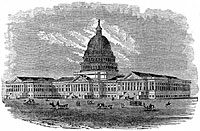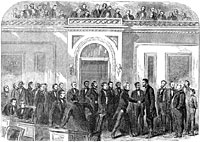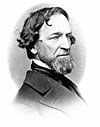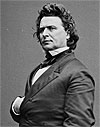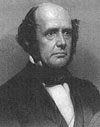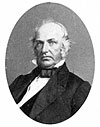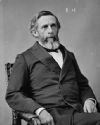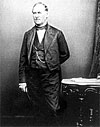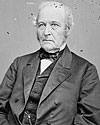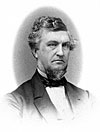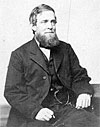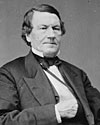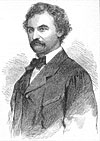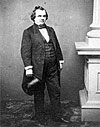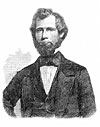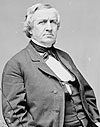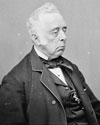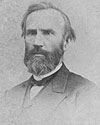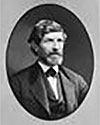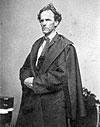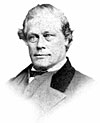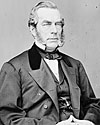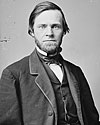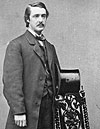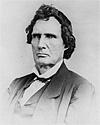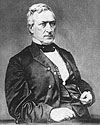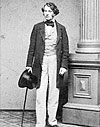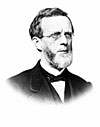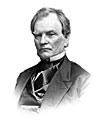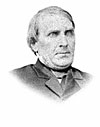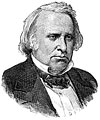President Lincoln paid special attention to the patronage requests of members of Congress. Congressmen George Julian recalled that President Lincoln was assailed by an “army of place-seekers.” The President had to balance the interests of different party factions in order to maintain the delicate balance of power within the Republican Party. His own disappointments with presidential patronage in the late 1840s may have affected his careful attention to the distribution of federal jobs. Early in his presidency, he was beset by Jesse K. DuBois, an old friend and colleague from Illinois who pestered the President for an Indian affairs job for his son-in-law. Mr. Lincoln replied: “I was nearly as sorry as you can be about not being able to give Mr. Luce the appointment you desired for him. Of course I could have done it; but it would have been against the united, earnest, and I add, angry protest of the Republican delegation of Minnesota, in which state the office is located. So far as I understand, it is unprecedented, [to] send an officer into a state against the wishes of the members of the congress of the State, and of the same party.”
Other congressional visitors were concerned with the progress of the war. Most prominent among these were members of the Committee on the Conduct of War in which Radical Republicans were prominent. The leaders of the group were Senators Benjamin Wade, its Chairman, Zachariah Chandler and Lyman Trumbull. They were persistent critics of the conduct of the war and particularly the conduct of Democratic generals like George McClellan. Presidential aide John Hay called them the “Jacobins.”
On one occasion in December 1862, Senate Republican leaders descended on the White House to urge a cabinet shakeup and the dismissal of Secretary of State William H. Seward. The Republicans had been prodded by complaints of Secretary of the Treasury Salmon Chase, but President Lincoln manipulated the situation to his advantage. He forced members of his cabinet to defend his actions to the Senate and effectively damaged the credibility of Chase, who submitted his resignation. The President, with the written resignations of both Seward and Chase, had asserted his control of the Cabinet and Congress.
Many members of Congress thought they knew how to do the President’s job much better than did Mr. Lincoln. The Senate revolt was the fruit of their frustration. “The moderate and radical Republicans were not united on most social or economic programs. There were among them high tariff men and free traders; some were concerned about land speculation and wasteful bounties of land grants to railroads, others were not, but they were united in wanting a tough war on the South,” wrote Mark M. Krug, the biographer of Illinois Senator Lyman Trumbull.1 Trumbull, who himself had wanted to run for President in 1860, occasionally was one of Mr. Lincoln’s toughest critics. He and other Senate Republicans were upset by President Lincoln’s reluctance to enforce provisions of two “Confiscation” laws passed by Congress, which would authorize tough measures against those engaged in the rebellion.
According to historian Allan Nevins, “the Congressional radicals never had enough public support to control the government, and they knew it. However abusive of Lincoln such men as Chandler and Thaddeus Stevens might be in private talk, they did not yet dare yet an open encounter with him. The caustic Stevens, in fact, served Lincoln well on many issues.”2 Mr. Lincoln understood how to deal with the radicals and also with moderates who were cautious in their approach to slavery and the war. “Both of the Republican factions were puzzled at times as to which side Lincoln espoused, and so also were more objective observed,” noted historian T. Harry Williams. He noted that the “President was like a man trying to handle two horses, [Congressman Owen Lovejoy] conjectured. The superb Radical horse wanted to clear all barriers at once, while the poor Conservative horse held back. Lovejoy criticized Lincoln for checking the forward steed but then added: ‘If he does not drive as fast as I would, he is on the same road, and it is a question of time.”3
Members of Congress were often alienated from or aggravated with the president, and felt free to express themselves. Writing of a day at the White House in April 1864, Ohio Congressman Albert Gallatin Riddle wrote: “I went that morning to take leave of the President. I had seen him but once before. I was pained, almost shocked, by the change in his looks and manner wrought during the intervening five months. He looked like a man worn and harassed with petty faultfinding and criticism, until he had turned at bay, like an old stag pursued and hunted by a cowardly rabble of men and dogs. He received me as if he hardly knew whether he had not to ward off a baiting. I came to understand something of this on that Saturday forenoon at the White House. There were a number of people in the President’s anteroom, and I very soon found that the President himself was undergoing a rude roasting at the hands of those who were waiting for admission to his presence….The one most loud and bitter was Henry Wilson, of Massachusetts. His open assaults were amazing. I withdrew to the President’s desk to escape, but was annoyed by it even there, and I turned upon the Senator in indignant surprise, asking why he did not assault him in the Senate, get a seat in the June convention, instead of opening on him in the streets and in the lobbies and offices of the Executive mansion itself. He conceded what I asserted—that the entire North stood with the President and would renominate him, and said that, “bad as that would be, the best must be made of it.” “Yes, and this is the way you are doing your share of that best work,” was my rejoinder.”4
Some members within the party’s radical faction continued to oppose the President – especially on war and reconstruction policies even while they gave up opposing him for the Republican presidential nomination. Mr. Lincoln ignored most of the criticism: “If I were to try to read, much less answer, all the attacks on me, this shop might as well be closed for any other business,” said the President to a Union general who asked him to response to a report by the Committee on the Conduct of the war. “I do the best I know how; the very best I can; and I mean to keep doing so until the end. If the end brings us out wrong ten thousand angels swearing I was right will not make any difference.”
The conflict came to a head again in July 1864 when Mr. Lincoln pocket vetoed the Wade-Davis bill on reconstruction. Congressman Henry Winter Davis and Senator Benjamin Wade were infuriated and published on August 5, 1864 the Wade-Chandler Manifesto denouncing the President. After a miserable August for Mr. Lincoln, Republicans rallied around the President again in September as Senator Zachariah Chandler induced John C. Frémont to withdraw his independent candidacy in exchange for the dismissal of Postmaster General Montgomery Blair from the Cabinet. Nonetheless, it was hard for Congressman Davis to support Mr. Lincoln, according to historian Gerald S. Henig: “Not only did he personally dislike Lincoln, but he sincerely felt that the President was entirely unfit for the duties of his office. Various efforts by party leaders to persuade the congressman to draw his ‘flaming sword of rhetoric’ and to ‘deal some heavy blows at the ‘peace party’ and their peaceful chief ‘little McClellan’ proved to no avail. Davis continued to dodge the issue until September 24, when he met with Senator Zachariah Chandler in Washington.”5
Although President Lincoln exercised his mastery over Congressional Republicans on key issues of war, slavery and reconstruction, on many other issues he ceded authority to these leaders. “In the Senate were Republicans of long experience in both state and national office. William Pitt Fessenden, Charles Sumner, Henry Wilson, Zachariah Chandler, Jacob Collamer, Lyman Trumbull, Benjamin F. Wade, and John P. Hale had long senatorial service behind them, while David Wilmot, John Sherman, and others had been in the House of Representatives,” wrote historian William P. Hesseltine. “With such political talent in the legislature, Lincoln made no effort to assume leadership in legislation. He had, indeed, no legislative program to promote, and faced none of the problems of the legislative leader who needed to bargain and cajole, to coerce and to compromise to get support for a bill. On the other hand, he had a war to conduct, and needed the support of an integrated national party to bring it to a successful conclusion.”5 He rarely used the full force of presidential persuasion – with the exception of the passage of the Thirteenth Amendment abolishing slavery in the United States.
Sometimes, it seemed as if the president was at war with his own party in Congress. Pennsylvania Congressman Thaddeus Stevens once snortingly claimed that Lincoln’s only friend in the House was Isaac Arnold, the one-time Democrat from Chicago.” Pennsylvania journalist Alexander K. McClure wrote: “I distinctly remember his reference to the fact that of all the Republican members of the House he could name but one in whose personal and political friendship he could absolutely confide. That one was Isaac N. Arnold of Illinois.”7 But Lincoln had other close friends like Illinois Senator Orville H. Browning and Congressmn Owen Lovejoy and Elihu B. Washburne. Of course, even his close friends usually had complaints about patronage. And even for a longtime friend like Browning, there was jealousy of Lincoln’s position. Browning wrote a friend in early September 1864: “You know, strange as it may seem to you, that I am personally attached to the President, and have faithfully tried to uphold him, and make him respectable, tho’ I never have been able to persuade myself that he was big enough for his position. Still, I thought he might get through, as many a boy through college, without disgrace, and without knowledge and I fear he is a failure.”8
Historian Allan Nevins quoted House Speaker Galusha Grow as observing of Mr. Lincoln: “He never rubbed Congress the wrong way. He was masterful in diplomacy as in politics.” Allan Nevins himself wrote: “Of course he repeatedly did rub Congress the wrong way, but never in such wise as to leave any deep rancor. While in vital matters he had his way, he forced no humiliating capitulations; as he put it, he never planted a thorn in another man’s pillow.”9
Congressman Shelby M. Cullom recalled that “Congress in the days of Lincoln was a conservative, hard-working body, jealous of its prerogatives…President Lincoln was freely criticised; he had bitter opponents in Congress, as he had outside; but there were others who, with the great majority of the people, placed implicit faith in him and felt certain that he would carry the country through the awful crises and eventually save the Union.” Newly Congressman Cullom recalled visiting Lincoln in early 1865. “I asked him, ‘Mr. Lincoln, do you allow anybody to talk to you about yourself?’ He said, ‘certainly; sit down’ I told him that I wanted to talk with him a little about what I had seen and heard around Congress since coming here, and said it seemed to me that most of the strong men were against him. He replied, with a smile,’ It is not quite so bad as that,’ and with that he took up a copy of the ‘Congressional Directory,’ with the remarks that there were many congressmen on his side, and turning to the list of senators and representatives he went over it for my benefit. I saw that nearly every name was marked, and as he went down the list he commented on each, as, for instance: ‘This man is for me’; ‘The best friend I have’; ‘He’s not for me now, but I can win him over,’ and so on. I found that he knew almost positively how every man stood, and the great majority of them were for him.” Cullom added: “It was an interesting catalogue of personal characteristics, and I knew then that Abraham Lincoln’s habit of studying men had not lapsed when he went to Washington; and I saw, too, that he had a perfect knowledge of Congress and its personnel.”10
Footnotes
- Mark M. Krug, Lyman Trumbull, p. 215.
- Allan Nevins, The War for the Union: War Becomes Revolution, Volume II, p. 190.
- T. Harry Williams in Don E. Fehrenbacher, editor, The Leadership of Abraham Lincoln.
- Albert Gallatin Riddle, Recollections of War-Times: reminiscences of men and events in Washington, p. 267.
- Gerald S. Henig, Henry Winter Davis, pp. 223-224.
- William P. Hesseltine, Don E. Fehrenbacher, editor, The Leadership of Abraham Lincoln, p. 77.
- Alexander K. McClure, Lincoln and Men of War-Times, pp. 125-126.
- David Herbert Donald, “We Are Lincoln Men” Abraham Lincoln and His Friends, p. 138.
- Nevins, The War for the Union, War Becomes Revolution, 1862-1863, Volume II p. 197-198.
- Nathan William MacChesney, editor, Abraham Lincoln: The Tribute of a Century, 1809-1909, pp. 500-501 (Shelby M. Cullom, “Lincoln and His Relations with Congress”)
Visit
Abraham Lincoln and Members of Congress
Members of Congress (Mr. Lincoln and Friends)
Republicans (Mr. Lincoln and New York)
Democrats (Mr. Lincoln and New York)

